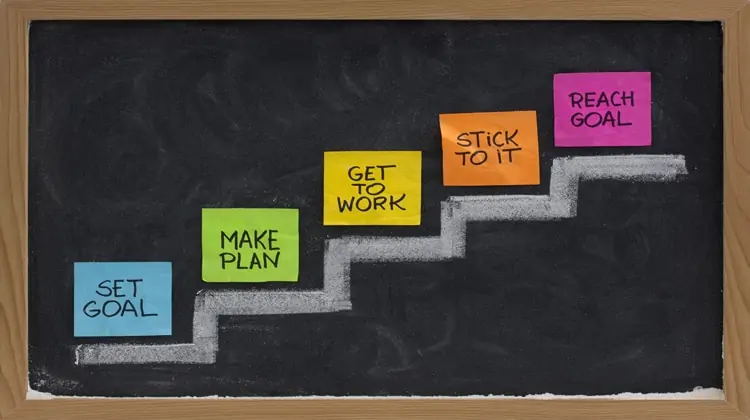THIS POST MAY CONTAIN AFFILIATE LINKS. PLEASE SEE MY DISCLOSURES FOR MORE INFORMATION

I remember my first job out of college.
I busted my butt to show my manager I was a great employee.
Come review time, I was rewarded with a 3% pay increase.
I was happy.
But then I started talking to my co-workers.
I learned that many of my peers also earned a 3% raise.
Even the ones who were slackers.
You know the type.
They come in a few minutes after starting time, take a little longer lunch, goof off throughout the day, and may even pack up a few minutes early.
I was mad.
Why did I earn the same raise as they did when I worked so much harder?
The next year, I worked just as hard.
And I got the same raise they did.
I was even more angry.
So I started slacking too. And I got the same 3% as before.
At this point, I could have just accepted the 3% raise, but I wanted more out of my career.
I wanted to earn more so I could reach my financial dreams.
So I started to research how to ask for a raise.
After a lot of research, I had a plan.
Long story short, after using the techniques I am going to show you, I have been able to land between 5% and 8% raises annually.
And it is easy to do.
Here is your guide to how to get a raise at work.
Table of Contents
How To Ask For A Raise At Work And Get It
To make the process of earning more money at work easy, I am going to break it down into steps for you.
All you have to do is follow each step in order and you will be rewarded with a larger pay increase than you’ve ever received before.
Step #1: Determine Your Pay Range
In the past, figuring out your pay range was next to impossible.
But thanks to technology, you can jump online and get a rough idea to see what you should be earning given your job title and your geographic location.
Your homework is to first research salary ranges for your job description.
It is important to remember to use salaries in your area.
This is because the cost of living varies throughout the country.
If you live in North Carolina, the salary for the same position in Los Angeles is going to be much higher because of the difference in cost of living.
Here is a simple to use salary calculator.
Just enter your job, location, and a few other details and you will know instantly the pay range for your position in your area.
Once you have your pay range data, it is time to determine how much of a raise you should ask for.
Step #2. Determine Your Salary Increase
When it comes to figuring out what dollar amount or raise percentage you want on your salary, the first step is to see where you fit in the pay range of your job.
If you are making less than or close to average, it will be easier to ask for a 5% raise or higher.
But if you are making significantly more than the norm, getting a large increase may be tough.
This is because all jobs have a limit to what they pay.
If you find you are close to the maximum for your position, you might be better served talking to your manager about a promotion.
Maybe you can become an assistant vice president, a manager or director in your department.
This would allow you to get larger raises than sticking with the same role.
For most people, a safe ask is 5%. You could ask for a dollar figure as well, for example, $10,000.
But chances are more likely to get your ask if you use percentages.
The reason is simple.
Hearing 5% is much less of a shock than hearing $10,000.
Step #3: Discuss Your Salary With Your Manager
This is the biggest mistake most employees make.
They are reactive instead of proactive.
Most workers have their performance review with their manager and are told of their raise.
When it comes in lower than they were hoping for, they try to make a case for themselves, usually to no avail.
The problem is, most budgets are set and there isn’t a lot of wiggle room for getting a larger salary.
Instead, you need to be proactive.
Before your review, you need to have a meeting with your manager and talk about your salary.
Ideally, this should be 6 months before your annual evaluation.
This will allow you to have an open discussion of what you want your raise to look like, as well as what steps you need to take to get it.
For many, this meeting is scary. It is hard to talk salary negotiation with our boss.
But it has to be done.
Later in this post, I will walk you through a detailed example on how to ask for a raise.
For now, just know that you need to be open to hearing what your boss is telling you.
Write down what is expected of you to earn a higher salary increase.
Then take a few days to let everything sink in and look over your notes.
If you have any questions, be sure to follow up with your manager.
Step #4: Outline Your Path To A Larger Promotion
The next step you need to take is to outline your path to getting a larger salary.
What are the things you were told you need to do? How are you going to go about it?
This is where some planning will come in handy.
You may even want to go to lunch with your manager to discuss your plan.
For example, you might need to take on additional responsibilities to earn your raise.
By talking with your boss, you might find out a way to do this is to become part of a development project team in other departments.
Or maybe one of your co-workers is doing the work of 3 employees and learning a few of their tasks will help everyone out.
Step #5: Get To Work
You asked for the raise, now you have to go out and put in the effort.
You took the initiative to ask for a higher pay, now you have to follow up on that responsibility.
So get to work so you can reach your goal.
As you are working hard, have your plan in place and are making progress in completing it, you might think there is nothing left to do.
But there is.
You need to document everything along the way.
Don’t leave it up to your boss to figure out what you have been doing.
Show them.
Take notes on how you were trained by your co-worker on 3 of his duties and now complete them on your own.
Take notes on how you created a cost savings program with 2 other co-workers and how you have successfully implemented 3 changes.
Then show how much money those 3 changes are going to save the company over the course of 12 to 18 months.
The more notes and documentation you have, the better.
Not only does it show you were serious about working harder to earn a bigger raise, but your notes will help your boss too.
They have proof when they request a larger salary for you from upper management. They don’t have to spend their time putting a report together, you did it for them.
Step #6: Follow Up With Your Manager
About a month before your review, have one last sit down with your manager.
Do some meeting prep and share with them the things you did and the notes you took along the way.
Then ask if you will be getting a larger raise.
They may not be able to tell you, but sometimes will.
Usually you can get a feel for the how likely it will be you get your raise by the tone of the meeting.
At this time, all that is left for you to do is keep working hard and taking notes.
Step #7: Get The Raise You Deserve
The time has come for your review.
The meeting should be an easy one, since your manager knows what you’ve been up to and you both know what you are expecting in terms of compensation.
Now only one of two things can happen.
#1. You get the raise
#2. You don’t get the raise
If you get the raise, thank your manager and then tell them you would like to follow up in a few months to discuss your performance to make sure you are performing as expected.
At that follow up meeting, you can discuss more job responsibilities going forward and earning a raise next year.
Then celebrate. You put in the hard work and earned the larger pay you requested.
If you didn’t get the raise, don’t lose hope.
First, ask your manager why.
If they say you didn’t meet your outlined goals, talk about it. Be open to the honest feedback.
Don’t take it as criticism. Look at it as an opportunity to learn and grow.
If you give yourself an honest assessment, you should be aware you were missing the mark through your notes and the follow up meetings you were having.
There might be other valid reasons, like the company isn’t performing as well, there were recent budget cuts, the economy is in recession, etc. too.
All are valid points.
If any of these issues are raised as to the reason why you didn’t get the raise, present an offer to your manager.
Ask them to have a follow up in 6 months.
If your performance remains high and the company is doing better, ask for the difference in salary then.
For example, let’s say you were asking for a 6% raise and only got 2%.
In 6 months, if the business is doing better, ask if you can get the other 4%.
Understand that sometimes it may take longer than 6 months to have the economy improve or business to turn around.
So you have to be patient.
Another option is to ask for a bonus.
A one time merit based bonus might be easier for your manager to make happen than an ongoing increase in pay.
Of course, the ideal scenario is a pay raise, but if your options are a bonus or nothing, the bonus is better.
However, if you find this is an ongoing excuse, you may have to cut ties with the company.
In this case, you want to update your resume and LinkedIn profile and start networking with people.
The good news is updating your resume should be easy since you have detailed notes on the work you have been doing recently.
When you are offered a new job, be sure to negotiate your starting salary to you don’t miss out on money.
And if your current company offers you a large raise to stay, think long and hard about it.
While the higher salary and ease of staying put are nice, remember that you did everything you were asked and still didn’t get the raise.
What is going to change that going forward?
In other words, you likely won’t be seeing a large salary increase until you decide to leave again.
Frequently Asked Questions
I get asked a lot of questions about asking for a raise.
I’ve outlined the most common ones below and update the list as more come in.
How to ask your boss for a raise?
The most common ways to ask are in person and over email.
You should try to ask in person as much as possible, but we all have that one boss who is close to impossible to track down.
Still try first to set up a time to talk and discuss a raise.
If that doesn’t work, then asking through email is your next best option.
When you do ask, make sure you are clear and direct in what you want.
Don’t sugar coat it or beat around the bush.
If you want a 10% raise, ask for it and be confident when you ask.
Be prepared for questions, so have compelling examples why you deserve a higher salary.
When should I ask for a raise?
Most employees ask for a raise during their performance review.
This is a mistake because the budget for next year has mostly been set.
Instead, you want to ask for a raise at least 6 months before you usually have your review.
So if you have your review in December, a good time to have the conversation about a higher salary is in June.
How much of a raise should I ask for?
The average annual raise is between 2-3%. This is in line with the inflation rate.
I would suggest you ask for at least 5%.
While you could ask for more, you really need to be the absolute best worker by far at your place of employment.
The trick is asking for more without sounding greedy.
This is why I like asking for 5%. It is a good pay raise.
How often should you get a raise at work?
You should get a raise every year at work.
Of course, there are situations when you might not get a raise.
For example, if the company or the economy hits a rough patch, the company will try to keep costs as low as possible.
In this case, I would not be asking for a 5% raise if you know things are tough.
For example, asking for a larger salary during the Great Recession would have been a dumb move.
Just be happy if you get a 2-3% raise during these times.
But understand that these are the times you should also shine.
You can take on more work or find ways to save the company money.
Then when the business or economy does turn the corner, you have a proven history of hard work that you can use as proof when asking for a larger salary.
Is it greedy to ask for a salary increase every year?
This depends.
If you are outperforming your job duties, there is no reason why you can’t ask for an increase that is larger than average every year.
But if you are in line with expectations, you will be wasting your time asking for a 5% increase every year and look greedy at the same time.
For most readers, I would suggest asking for a 5% raise one year, and then accepting the normal standard of living increase the following year.
If you feel comfortable asking for more during your next performance review, then follow the process all over again.
How to ask for a raise in writing?
Officially asking for a promotion through hard copy is not only easy, but it is the preferred method by many.
There are several reasons to this, including:
- Formal request. By having a hard copy, you can use it as proof if the case should arise.
- Asking for a raise at work can be hard for many. By putting it in writing, you organize your thoughts and create a better case for yourself.
- Better outcome. When you have a discussion with your boss about raising your pay, most times the request will surprise them. By submitting a letter ahead of time, you make the meeting that much more productive.
ow that you see why asking for a raise in this way is ideal, what should the letter say?
Here is a sample script when asking for a raise. You can edit it to make it unique to you.
[INSERT BOSSES NAME],
I want to thank you for the opportunities you’ve provided me as a [ENTER JOB POSITION] during my time working for [INSERT COMPANY NAME]. Over the past [NUMBER] years, I’ve grown significantly as a professional both through improving my skill set and the additional responsibilities I’ve taken on. I have also deepened my understanding of the industry as a whole.
For these reasons, I would like to request an adjustment to my salary.
During the past year, I have accomplished the following:
- [INSERT ACCOMPLISHMENT]
- [INSERT ACCOMPLISHMENT]
- [INSERT ACCOMPLISHMENT]
- [INSERT ACCOMPLISHMENT]
I would like to request a base salary increase of [ENTER DOLLAR AMOUNT OR PERCENT] which is in-line with the salary range for a [JOB POSITION] with my level of experience in our region.
If possible, I would like to meet to discuss my request in person. I am happy to work with you to accommodate my request and am open to negotiation. Please let me know when would be the best time to discuss this in more detail.
Sincerely,
[YOUR NAME]
If you would rather prepare the letter on your own, here are a few tips to make it stand out.
#1. Highlight your achievements. Make sure you highlight all the things you’ve accomplished and the value you bring to the company so they know you deserve a raise. This is what they will be basing your raise off of, so make sure you include everything here.
#2. The amount you want. This can either be in dollar amount or percentage. But make sure you specifically say it. This will help your boss know what you are expecting and be able to work around it.
#3. Show gratitude. Thank both your boss and the company for giving you the job you have and for considering your request. The more grateful and humble you are, the better.
How to ask for a raise when underpaid?
Being underpaid is something many workers have to deal with.
But a simple request asking for a larger salary can do the trick to earning what you are worth.
To do this, you first have to confirm you are being paid less.
Use a salary wizard that is specific to your locale and job title to see what the salary range is for your job.
If you are making less than you should, you now have proof you deserve more pay.
As with highlighting your accomplishments I’ve talked about previously, you want to do that here too.
If you just go into the meeting saying you are underpaid and want a bigger salary, you might not get it.
But if you show the typical salary for your position and show the value you bring, you have a better chance at getting a raise.
What is the best way to ask for a raise?
The best way to ask for a raise is in writing.
Draft a letter after you do your research and then hand it in to your boss.
Explain what the letter is about and that you want to sit down in a week to discuss it in more detail.
The second best option is to schedule a meeting before your review and have an open conversation with your boss about your desire.
You may be asked to document everything after this meeting, so it is best to prepare all of your accomplishments beforehand.
Wrapping Up
How to get a raise in salary is a scary thing for many.
They think that the company won’t listen to them or might fire them.
But you have to remember that it is a lot cheaper to keep you as an employee, even at a higher salary, than it is to hire and train a new employee.
So be confident in asking for a raise.
Show your worth to the company and then present this, along with your salary demands in writing.
You have everything to gain as even if you don’t get the raise, they know you expect more and you have the things you need to do to get the higher salary.





